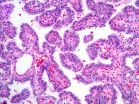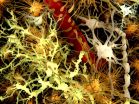European multicenter harmonization study shows anaplastic lymphoma kinase immunohistochemistry testing comparable to, if not better than, fluorescence in situ hybridization testing
2014-10-23
(Press-News.org) DENVER – Sixteen institutions across Europe collaborated together to show for the first time that a semi-quantitative anaplastic lymphoma kinase (ALK) protein expression test, immunohistochemistry (IHC), is reliable amongst several laboratories and reviewers when test methodology and result interpretation are strictly standardized and the scoring pathologists are appropriately trained on the test.
ALK tyrosine kinase inhibitors (TKIs) shrink tumors and increase progression-free survival in late-stage non-small cell lung cancer (NSCLC) patients positive for ALK as determined by the fluorescence in situ hybridization (FISH) test, a test for DNA rearrangement within the gene. Testing positive for ALK is required in order to be prescribed the therapeutic inhibitors. However, the FISH test is expensive, time-consuming, and requires specialized equipment and expertise. Many other studies have shown comparable results between IHC and FISH but none have compared a highly standardized test and scoring methodology performed at multiple institutions in numerous countries.
Fifteen well-characterized NSCLC specimens were tested and scored for IHC at 16 institutes of pathology in Belgium, Denmark, France, Germany, Scotland, Spain, Sweden and Switzerland. The specimens were pre-tested 3 times by FISH at 2 separate institutions in Germany. Prior to the IHC testing all the equipment was standardized between all the institutions and the scoring pathologists all attended an internet-based training session with teaching cases.
The results published in the November issue of the Journal of Thoracic Oncology, the official journal for the International Association for the Study of Lung Cancer (IASLC), show that all 16 institutions agreed with 100% concordance on the 7 FISH/IHC negative and on 4 FISH/IHC positive specimens. There was also 100% concordance from all institutions on 2 obvious IHC positive cases that were uncertain by FISH ("borderline"). These 2 cases were confirmed ALK positive by a third test, reverse transcription-polymerase chain reaction (RT-PCR). The last 2 cases were ALK-FISH positive and were scored IHC positive by 15/16 and 12/16 institutions, respectively. However, those not scoring these 2 cases as unequivocal ALK IHC positive, called them IHC equivocal and would have demanded an additional ALK test (FISH, PCR) under diagnostic conditions.
The authors conclude "after harmonization of the staining instruments and training of the observers, the ALK IHC assay can be regarded as a reliable multicenter technique for the detection of ALK protein expression". For the future the authors note "there is need to compare validated ALK IHC assays and ALK-FISH in clinical trials as therapy response data of patients with differing ALK IHC and FISH results will help to implement ALK-IHC not only as a prescreening tool, but also as a potential stand-alone test (at least in cases displaying a clear staining pattern). Until then ALK diagnosis should be based on the rational application of both methods adapted to the given case as FISH has some disadvantages and even validated IHC may produce equivocal staining patterns."
INFORMATION:
Lead author Dr. Maximilian von Laffert, senior author Dr. Manfred Dietel, and co-authors Drs. Arne Warth, Keith M. Kerr, Fernando Lopez-Rios, Patrick Pauwels, Lukas Bubendorf, and Alex Soltermann are members of IASLC.
About the IASLC
The International Association for the Study of Lung Cancer (IASLC) is the only global organization dedicated to the study of lung cancer. Founded in 1974, the association's membership includes more than 4,000 lung cancer specialists in 80 countries. To learn more about IASLC please visit http://www.iaslc.org
ELSE PRESS RELEASES FROM THIS DATE:
2014-10-23
DENVER –CANARY, Computer-Aided Nodule Assessment and Risk Yield, is a novel software tool developed at Mayo Clinic that can automatically quantitate adenocarcinoma pulmonary nodule characteristics from non-invasive high resolution computed tomography (HRCT) images and stratify non-small cell lung cancer (NSCLC) patients into risk groups that have significantly different disease-free survival outcomes.
The majority of NSCLC patients are diagnosed with advanced-stage disease which is concomitant with an exceptionally poor prognosis, 5-year survival rate of 4%. In ...
2014-10-23
In individuals living in the Arctic, researchers have discovered a genetic variant that arose thousands of years ago and most likely provided an evolutionary advantage for processing high-fat diets or for surviving in a cold environment; however, the variant also seems to increase the risk of hypoglycemia, or low blood sugar, and infant mortality in today's northern populations. The findings, published online October 23 in Cell Press's American Journal of Human Genetics, provide an example of how an initially beneficial genetic change could be detrimental to future generations. ...
2014-10-23
People may have been making their way from Easter Island to the Americas well before the Dutch commander Jakob Roggeveen arrived with his ships in 1722, according to new genomic evidence showing that the Rapanui people living on that most isolated of islands had significant contact with Native American populations hundreds of years earlier. The findings reported in the Cell Press journal Current Biology on October 23 lend the first genetic support for such an early trans-Pacific route between Polynesia and the Americas, an impressive trek of more than 4,000 kilometers (nearly ...
2014-10-23
Synthetic gene networks hold great potential for broad biotechnology and medical applications, but so far they have been limited to the lab. A study published by Cell Press October 23rd in the journal Cell reveals a new method for using engineered gene circuits beyond the lab, allowing researchers to safely activate the cell-free, paper-based system by simply adding water. The low-cost, easy-to-use platform could enable the rapid detection of different strains of deadly viruses such as Ebola.
"Our paper-based system could not only make tools currently only available ...
2014-10-23
ANN ARBOR, Mich. — A new comprehensive analysis of thyroid cancer from The Cancer Genome Atlas Research Network has identified markers of aggressive tumors, which could allow for better targeting of appropriate treatments to individual patients.
The finding suggests the potential to reclassify the disease based on genetic markers and moves thyroid cancer into a position to benefit more from precision medicine.
"This understanding of the genomic landscape of thyroid cancer will refine how it's classified and improve molecular diagnosis. This will help us separate ...
2014-10-23
LA JOLLA, CA – October 23, 2014 - Scientists at The Scripps Research Institute (TSRI) have discovered a way to decrease deadly protein deposits in the heart, kidney and other organs associated with a group of human diseases called the systemic amyloid diseases.
"If we can develop a strategy to reduce the load that's coming from these proteins, then we can open up treatment options that could be broadly applied to treat multiple systemic amyloid diseases," said Luke Wiseman, assistant professor at TSRI and a senior author of the new research.
In related studies ...
2014-10-23
California's position as a leader in tobacco control is under threat, according to a new report from the UC San Francisco Center for Tobacco Control Research and Education. Once a highly successful program and international model, the state's anti-tobacco efforts now appear to be waning due to the decreased spending power of the California Tobacco Control Program, a resurgence of the tobacco industry in state politics, and the emergence of new unregulated tobacco products.
"The combination of weak leadership at the state level, willingness of political leaders to accept ...
2014-10-23
Federal Express® and UPS® are no match for the human body when it comes to distribution. There exists in cancer biology an impressive packaging and delivery system that influences whether your body will develop cancer or not.
One area of interest focuses on histones, the chief component of chromatin, a cluster of large molecules. Aberrations in chromatin are thought to lead to DNA damage such as with cancer. Researchers at The University of Texas MD Anderson Cancer Center announced findings indicating a possible new way of manipulating chromatin and its histones ...
2014-10-23
La Jolla, Calif., October 23, 2014 –A new study by researchers at Sanford-Burnham Medical Research Institute reveals the process that leads to changes in the brains of individuals with Down syndrome—the same changes that cause dementia in Alzheimer's patients. The findings, published in Cell Reports, have important implications for the development of treatments that can prevent damage in neuronal connectivity and brain function in Down syndrome and other neurodevelopmental and neurodegenerative conditions, including Alzheimer's disease.
Down syndrome is characterized ...
2014-10-23
Exosomes, tiny, virus-sized particles released by cancer cells, can bioengineer micro-RNA (miRNA) molecules resulting in tumor growth. They do so with the help of proteins, such as one named Dicer. New research from The University of Texas MD Anderson Cancer Center suggests Dicer may also serve as a biomarker for breast cancer and possibly open up new avenues for diagnosis and treatment. Results from the investigation were published in today's issue of Cancer Cell.
"Exosomes derived from cells and blood serum of patients with breast cancer, have been shown to initiate ...
LAST 30 PRESS RELEASES:
[Press-News.org] European multicenter harmonization study shows anaplastic lymphoma kinase immunohistochemistry testing comparable to, if not better than, fluorescence in situ hybridization testing





